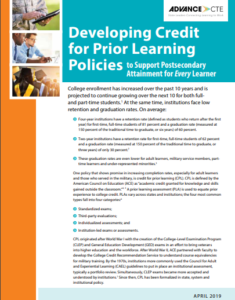 College enrollment has increased over the past 10 years and is projected to continue growing over the next 10 for both full- and part-time students. At the same time, institutions face low retention and graduation rates. One policy that shows promise in increasing completion rates, especially for adult learners and those who served in the military, is credit for prior learning (CPL). CPL practices have been found increase access to and the affordability of postsecondary opportunities for a variety of learners — particularly adults and members of the military.
College enrollment has increased over the past 10 years and is projected to continue growing over the next 10 for both full- and part-time students. At the same time, institutions face low retention and graduation rates. One policy that shows promise in increasing completion rates, especially for adult learners and those who served in the military, is credit for prior learning (CPL). CPL practices have been found increase access to and the affordability of postsecondary opportunities for a variety of learners — particularly adults and members of the military.
CPL policies can be found at the state, postsecondary system or institutional levels — and most often a combination of the three. Overall, control of CPL implementation tends to be greater at the local level than at the state level. Although creation and implementation of a formalized CPL policy typically falls to the state’s higher education system or the individual institution, state-level leadership can play a vital role in building support and momentum among stakeholders.
To help states explore the significant impact of CPL and what their role should be in supporting these opportunities, Advance CTE- with support from the Joyce Foundation- examined research and best practices in Developing Credit for Prior Learning Policies to Support Postsecondary Attainment for Every Learner. This report features data on the benefits of CPL for learners, as well as best practices in Colorado, Kansas, Louisiana, Minnesota, Tennessee and Virginia across topics such as CPL for military service members, portability of credits, building in apprenticeships and industry recognized credentials in CPL, and communicating about CPL opportunities.
The report concludes with recommendations for how states can support CPL with and without statute. The strongest action a state can take is to enact a state statute that calls for implementation of CPL in all public two- and four-year institutions. Minimally, every state should have statewide policies that address CPL’s quality and consistency and ideally make implementation mandatory at each public institution. Aside from state statute, the report recommends that CPL should be incorporated into the state’s broad postsecondary agenda in the following ways:
- Visible state leaders, such as State CTE Directors, governors and state higher education officials, should elevate CPL to be part of the conversation around education and workforce development.
- The state should lead the efforts to publicize what CPL opportunities exist.
- The state should facilitate coordination among the state, system and institutional levels in how CPL policies are developed and implemented.
The full report can be found here and a webinar on CPL featuring CPL leaders from Virginia and Louisiana can be accessed here.
Meredith Hills, Policy Associate
Tags: higher education, postsecondary, Postsecondary Attainment

